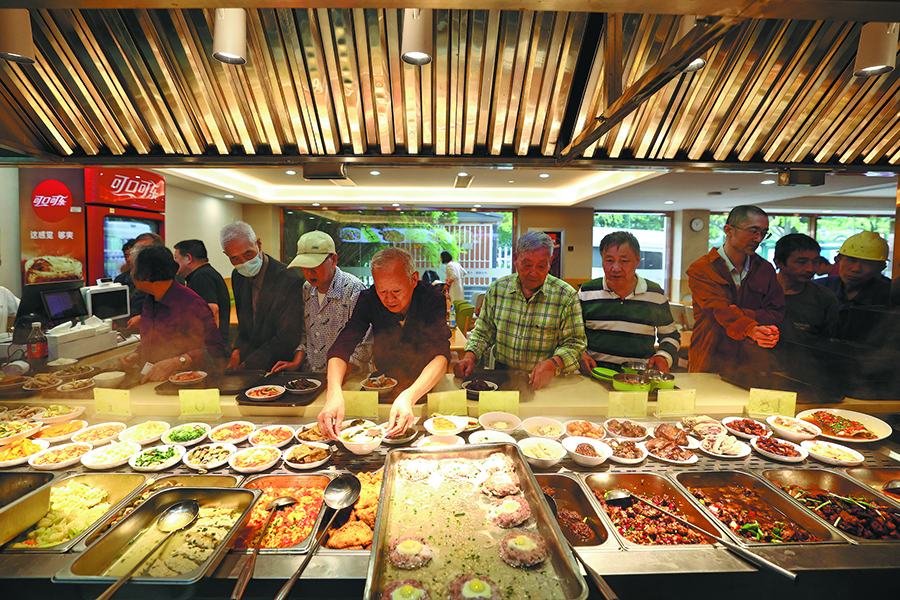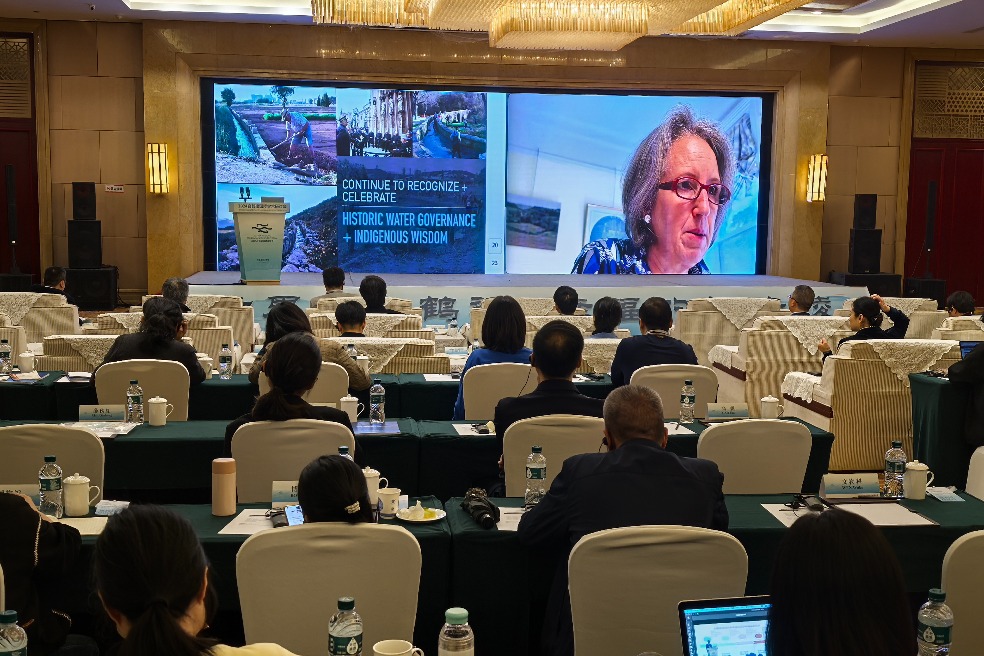Diners relish the taste of community canteens


Outlets nationwide popular with younger generation and seniors
For only 20 yuan ($2.75), Fang Wenjing tucked into a well-balanced lunch comprising a meat dish, a vegetable dish and a bowl of rice at a community canteen in Shangcheng district of Hangzhou, the capital of Zhejiang province.
"The dishes have a familiar, home-cooked taste, just as I expected. The canteen is also clean," said Fang, who works in the training industry.
She discovered the outlet, which is conveniently located 1 kilometer from her home and offers affordable prices, through the restaurant review app Dazhong Dianping.
On Oct 21, the day Fang visited the canteen, its clientele changed from elderly diners to a younger crowd in the space of an hour.
"I've ordered several takeaway meals in the past, but today, I want a freshly cooked, piping hot dish," Fang said, adding that the elderly generally view such dishes as "comfort food".
The popularity of community canteens has surged recently, especially among the younger generation. Boasting trendy designs and diverse menus, they have become a go-to dining option for many people after work, as they offer alternatives to takeaway meals and dining out.
While these canteens continue to provide convenience and affordability for the elderly, they also cater to the dining preferences of the younger generation, with extended opening hours and revamped designs. This shift in dining preferences is breathing new life into these community cafeterias.
The canteen Fang visits opened in February, and is located on the first floor of the Zijin Community Home Elderly Care and Support Center, which serves as a canteen for the elderly and other members of the public.
Zhang Suxia, assistant at the center, said chefs at the canteen cook special meals for elderly residents before making dishes for other customers.
"Food for the elderly should be cooked to a softer consistency, the flavors should be milder, and less oil must be used," Zhang said.
The canteen offers special discounts for the elderly. Those aged from 60 to 79 benefit from an 80 percent discount, diners aged from 80 to 89 receive a 70 percent reduction, and those older than 90 are eligible for a 50 percent discount.
Zhang said elderly customers often come to the canteen early. For example, they arrive at about 10:30 am to wait for lunch. The canteen starts service as soon as dishes are ready, and younger customers arrive at around noon.
Members of the public who top up their meal cards at the canteen with 500 yuan are credited with a balance of 580 yuan.
"Many of our younger customers always seem to be charging their meal cards," Zhang said.
A group of young white-collar workers from a nearby company has arrived at the canteen for lunch each working day since the outlet opened, she added.
"They get to know our chefs, sometimes asking them to cook a dish that is not on the menu. We have many regular young customers such as this group, who live or work nearby," Zhang said.
The canteen closes at 7 pm, but Zhang said its opening hours can be extended based on young customers' requirements. "When there is such demand, we usually close at 8 pm or sometimes even later," she said.
For traditional holidays and festivals, the canteen provides set menus, for which diners need to book in advance.
"The canteen has more business on working days, and we only provide lunch on weekends, as we think that weekends are a time for younger people and the elderly to dine together with friends and family," Zhang said.
Must-visit destination
A trendy and innovative community canteen has proved increasingly popular since it opened at the Fuxingli Community in Shangcheng, Hangzhou, at the start of this year. It has become a "must-visit" destination for all age groups at this location.
The elderly gather on the canteen's terrace early in the morning after exercising to chat among themselves and relax. In the afternoon, the canteen becomes a workplace for many young professionals.
Dazhong Dianping user "Cuzhuangqieluoli 66" said: "While it's a community canteen, it can just as easily be described as a Western restaurant. The interior is beautifully designed, and there is a fantastic ambience and high level of cleanliness. There is also an abundance of greenery."
Hu Yifan, head of the canteen, said some 30 percent of its customers are 60 or older, and the remaining 70 percent are mostly young people.
The canteen operates as a vegetarian restaurant, offering a wide range of set meals, all priced at 28 yuan. These meals comprise a main dish, a serving of rice, a bowl of soup, fruit salad, and a side dish.
Zhou Yigang, the canteen's chef, said the set meals are well thought out, with a focus on nutritional balance.
Cooking of each dish is customized to match the customers' age group. For older diners, the dishes are tender and soft, and the hot pot flavors mild. Younger customers are served cuisine with a crisper texture.
"Tofu is clearly one of the most popular ingredients at our canteen, but it's the ambience that primarily attracts younger diners," Zhou said. "The canteen has become a trendy internet venue, which many young customers visit to immerse themselves fully in this experience.
"Our older customers are quite open-minded. They readily embrace new things, which is why they also appreciate the atmosphere in the canteen."
Zhou added that an increasing number of people are willing to try a vegetarian diet, including the younger and older generations. As a result, more restaurants serving this type of food are opening in Hangzhou.
Innovative operation
A community canteen at the Zhanongkou Community in Shangcheng recently launched "happiness blind boxes", which cost just 6 yuan per box and contain one meat dish and a vegetarian dish. Sales start at 7 pm each evening.
The dishes are packaged in transparent containers, but to maintain an element of surprise, stickers are placed over the lid of the "main dish" section of each box. The "blind boxes" have become popular since being introduced, and on some nights they sell out by about 8 pm.
Wu Yan, Party secretary at the Zhanongkou Community, has said these community restaurants are known as "Happiness Canteens."
A meal assistance program introduced in Zhanongkou subdistrict ensures the elderly can access meals within a 10-minute walk of their homes, or have them delivered within five minutes. The service has also been welcomed by younger people living and working in the area.
Wu said the rising numbers of young customers have given community canteens a significant boost.
To improve meal assistance services for the elderly, local government departments, including those responsible for civil affairs, have introduced policies to provide different levels of subsidies for canteen construction, along with dining expenses for the elderly, based on local needs.
In July, a three-year action plan through 2025 drawn up by 13 such departments, including the Ministry of Commerce, stressed the importance of exploring the development of community canteens and establishing meal assistance services for the elderly.
Data from Tianyancha, a leading corporate information provider in China, show that more than 6,700 community canteens are operating nationwide.
Yan Xuyang, a professor at Beijing Union University's Tourism College, said there are promising prospects for community canteens. He envisions that by 2035, those born from the 1970s to the 2000s will comprise the main group of customers for such outlets.
This generation has a reasonable level of disposable income, and many of its members may either lack the inclination or willingness to prepare meals for themselves, Yan said.
The successful operation of community canteens hinges on their ability to seamlessly integrate into the daily lives and culture of local residents. In addition to serving dishes to suit local tastes, and fostering a welcoming environment for diners, it is vital to widen the functions of these canteens.
Weng Ying, a staff member at the Nanxing subdistrict office in Shangcheng, said community canteens are used for cultural activities and other events, including training sessions and seminars focused on baking and nutrition.
Such initiatives are designed to boost awareness and foster a positive perception of these canteens among local communities.
In the latter part of last year, the Weikang community canteen in Ziyang subdistrict, Hangzhou, underwent a significant transformation from being a canteen for seniors to catering for the whole community. Its services have been broadened beyond regular operations to include services for hospitals and businesses, complete with home delivery options.
Some community canteens have introduced innovative self-service models. Beijing's Lugu Community in Shijingshan district has adopted a self-service approach, catering to local residents while also attracting customers from nearby commercial buildings.
Jin Jing, director of the Lugu subdistrict office, said the buffet-style dishes are priced at just 2.48 yuan per 100 grams, with a minimum order of at least 250 grams. This price is lower than those of neighboring eateries.
In Shenyang, capital of Liaoning province, a community canteen in Huanggu district has launched a set breakfast menu for a whole month, priced at 120 yuan.
As the elderly may face challenges in cooking, and many young people lack culinary skills, the community has converted long-vacant retail spaces into a canteen.
The outlet, which is open from 6 am to 10 pm each day, features a wide range of dishes low in salt and sugar. Less oil is also used to cook them.
This diverse menu with affordable prices has made the canteen exceptionally popular.
- Lai Ching-te pins hope on foreign support, but just illusion, say experts
- Sam Hou Fai elected Macao SAR's sixth-term chief executive designate
- Voting starts for Macao SAR's 6th-term chief executive election
- Rare comet Tsuchinshan-ATLAS visible until Oct 20
- Beijing supercharging stations empower sustainable, green travel
- Mainland considering further measures on Taiwan trade restrictions: commerce ministry



































